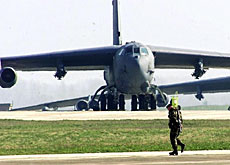Swiss neutrality comes under the spotlight

Switzerland has reaffirmed its long-standing policy of neutrality following the outbreak of war in Iraq.
But opinions differ in Switzerland over how that neutrality should be interpreted in the light of the conflict.
On Thursday the president, Pascal Couchepin, said he regretted the United States-led military action against Iraq, which had not been authorised by the United Nations Security Council.
He said Switzerland would remain neutral in what he referred to as “a conflict between nations”.
“When armed conflicts break out, neutral Switzerland’s role is not to take part.”
Couchepin said that for the duration of the war Switzerland was banning military, surveillance and reconnaissance flights over its airspace by the US and its coalition partners.
Military exports banned
On Thursday the government also decided to suspend military exports to all countries involved in the war.
A total ban would apply to exports of government-owned military supplies to the warring parties, the government said.
On the other hand, private manufacturers would be allowed to continue military exports if they could prove that the arms and material exported would not be used in the conflict.
Exports of military material, including munitions, guns, tanks and other vehicles were worth SFr277.6 million ($200.5 million) last year. The United States and Britain were among the top five importers.
While acknowledging the reaffirmation of Swiss neutrality, some political analysts were surprised by the government’s decision.
“There has been over the decades a very developed trade in weapons, or weapons’ parts, between Switzerland and the United States and Britain; so to issue such a ban is a little bit surprising and it will be difficult for Switzerland to implement,” Stig Förster, a professor of contemporary history at Bern University, told swissinfo.
Respect for the law
Förster said that Switzerland’s actions showed a respect for international law. Under the Hague Convention, Switzerland – as a neutral country – is not permitted to export armaments and other military equipment to conflict countries.
“They had to do this. Still I’m surprised, because I did not expect the Swiss government to stick by the law to such an extent, and I must say I congratulate them for this,” said Förster.
Philippe Braillard, a professor of political science at the University of Geneva, agreed with Förster that the government had done the right thing.
“Neutrality is not just a question of international law, it is also a political question,” Braillard told swissinfo.
“In a crisis like this one, the credibility of a neutral country depends on the attitude it adopts. And in this respect I think the government acted correctly.”
Freedom of choice
Braillard said Switzerland’s position as a neutral country outside the European Union gave it more freedom to act as it chose.
“The other neutral European countries are members of the EU. They are called to participate in a common foreign policy and in a future peacekeeping force,” he commented.
Although the attacks on Iraq were met with general condemnation in the Swiss parliament, the parties differed in their view of what the government should do in response.
The rightwing People’s Party went as far as to demand that Switzerland pull out of the United Nations in order to protect its neutrality. This was rejected by Couchepin as a “crazy idea”.
Couchepin said there was no question of Switzerland pulling out of the UN, which it joined last year.
swissinfo, Morven McLean
Switzerland says it will remain neutral throughout conflict with Iraq.
The Swiss government has banned US and allied aircraft from using its airspace during the Iraqi war.
The government has suspended military exports to the countries involved in the conflict.

In compliance with the JTI standards
More: SWI swissinfo.ch certified by the Journalism Trust Initiative











You can find an overview of ongoing debates with our journalists here . Please join us!
If you want to start a conversation about a topic raised in this article or want to report factual errors, email us at english@swissinfo.ch.